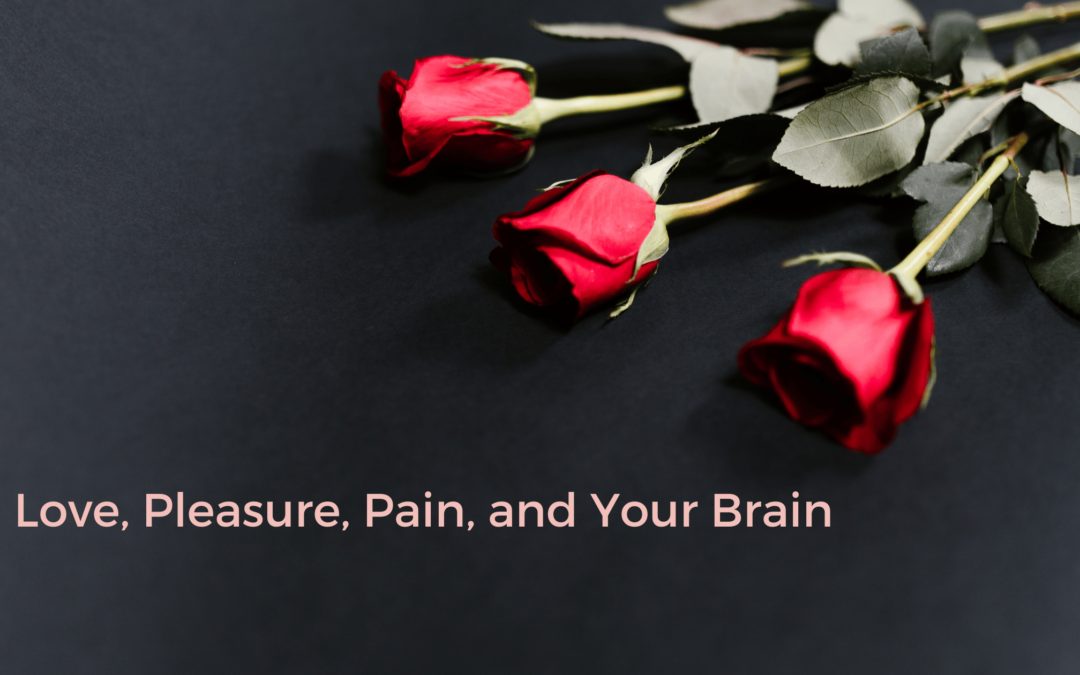Valentine’s Day is here again, and no matter what your relationship status is, chances are you’ve experienced the thrills, chills, and spills of romantic love. The feelings generated by a romantic attachment to another person can feel overwhelming, at times leaving us feeling blissfully expansive, and at times deeply distraught.
Ever had butterflies in your stomach or sweaty palms when you see someone you’re in love with? Or feel as if the heart in your chest physically hurts when you’re disappointed or betrayed by someone you love?
We may think that emotions don’t have any effect on our bodies, but scientific studies reveal otherwise. It turns out that both falling in love and breaking up have significant effects on our biology.
When you think of love, the first organ that comes to mind is probably your heart. But it’s really your brain where the changes triggered by love happen. Let’s get a brief peek at the chemicals generated by the brain and body that have such a powerful effect on our physiology.
Understanding the potent effect biology has on our state of mind can help to give us a better sense of agency in managing our emotional ups and downs.
Biology of Love’s Pleasurable and Positive Feelings
When you start falling in love, your brain produces chemicals like dopamine, and oxytocin. These cause feelings of pleasure, excitement, and belonging.
Dopamine:
The excitement you feel when you’re with the person you love, talk to them, or see them across the room, can be traced to the neurotransmitter dopamine. Dopamine is well associated with the brain’s reward centers and the release of this important chemical reinforces pleasure. Just thinking about the person you love is enough to trigger dopamine release. When dopamine is released in the brain, it can lead to feelings of euphoria, bliss, and enhanced motivation and concentration. We naturally want to reinforce and repeat the behaviors and thoughts that produce these positive feelings, which drives us to want to spend more time with the object of our affection.
Oxytocin:
Often referred to as the “bonding” hormone, Oxytocin boosts feelings of attachment, safety, and trust. Especially after the first exciting stage of a relationship, when your love makes it to a more settled phase, Oxytocin helps you to feel comfortable and relaxed in the company of a partner. Physical touch increases the release of Oxytocin, strengthening feelings of attachment. This may create a more solid bond, in part because it may decrease your interest in other potential partners. In sexual relationships, women tend to produce more Oxytocin than men, but as they age, men are likely to catch up.
Androgens:
That sexual lure you feel to someone you’re attracted to or falling in love with, is stimulated by the release of Androgens. These are a group of hormones that include testosterone. Testosterone increases libido in both men and women. Androgens boost blood flow to your sexual organs, increasing your desire for sexual contact. Engaging in sex further boosts production of these hormones, which can lead to the release of Oxytocin and Dopamine.
The Vagus Nerve and Synchronization:
The Vagus nerve begins in your brain and is the longest nerve in the body, connecting with almost every organ. It plays a role in everything from the steadiness of your heartbeat to your hand gestures and facial expressions. Scientists have observed that long term lovers begin to synchronize their heart rhythms, their breathing patterns, even their blood pressure- a process regulated by the Vagus nerve. This neurological alignment helps us to “tune in” to our partners, providing an essential mechanism for survival- the ability to detect trouble or pain in a beloved even when it isn’t evident to anyone else.
Adverse Effects of Love’s Biology
Both the beginning stages of a relationship, when you aren’t sure if feelings are mutual, and also when things aren’t going well, or your relationship is ending, your brain produces another set of chemicals, causing physical and emotional reactions.
Cortisol, Norepinephrine and Adrenaline:
When you start dating someone new, your stress usually intensifies. It’s not uncommon to lose your appetite, feel nervous, and have trouble sleeping. Cortisol, Norepinephrine and Adrenaline are the same hormones that are released when we face any kind of stress or crisis situation. They can make us jittery, cause butterflies in the stomach, and a racing heart.
Cortisol is the stress hormone, and it is released when you are in a high-stakes situation, whether you are being chased by a lion or falling in love. In the initial stages of a relationship, before you know whether the feelings and commitment are mutual, cortisol levels are typically high. They usually drop as the relationship stabilizes and partners are more settled with each other. If, however, your relationship is full of drama, cortisol levels remain high, and over time, this can lead to impaired immune system function, hypertension and even impede brain functions like memory. Many of the physical symptoms that accompany heartbreak are also related to the release of the hormone cortisol.
Suppressed functioning of the amygdala and the pre-frontal cortex:
Ever done something uncharacteristically silly, irresponsible, or even dangerous when you’re falling in love? Being in love causes certain parts of your brain to go temporarily dormant. One of these is the amygdala, which helps process fear, and is responsible for sensing danger. This can lead to engaging in risk-taking behaviors a person wouldn’t otherwise consider. The other region of the brain that becomes less active is the pre-frontal cortex. This part of your brain is involved in decision making, so when you’re in love, you may not make the best decisions. Ever heard the expression, “love is blind”?
Lacking access to a fully functioning amygdala and pre-frontal cortex, the brain of the person in love is less regulated, and prone to making poor judgments. This can have some critical consequences, leaving the person vulnerable to missing red flag behaviors.
While it helps to understand how your brain works, some folks need more than information. Knowledge while helpful, is not always the missing ingredient. If loving has impeded your ability to function in your daily life, please reach out
The Montare family of Behavioral Health Treatment centers is here to support you to have the most fulfilling, inspiring, and flourishing life you can imagine. Self-love, family love, friend love, pet love, nature love… all are such beautiful ways of experiencing the richness of what it means to be human.
Wishing you a Valentine’s Day full of love, expressed in whatever way brings you the most joy.

